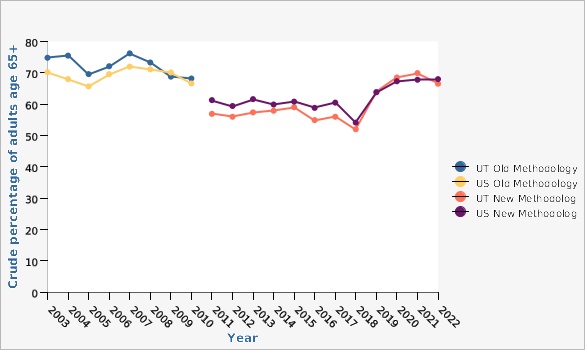Why Is This Important?
Influenza, or flu, is an acute viral infection involving the respiratory tract that can occur in epidemics or pandemics. Influenza can cause a person, especially older persons, to be more susceptible to bacterial pneumonia.
It was estimated that in the 2022/23 flu season, 31 million flu illnesses occurred in the U.S. resulting in 360,000 hospitalizations and 21,000 deaths. Among children, this season was classified as high severity.^1^
The annual direct medical costs (hospitalization, doctors office visits, medications, etc.) for influenza in adults are estimated at $8.7 billion including $4.5 billion for adult hospitalizations resulting from influenza-attributable illness. Influenza is also responsible for substantial indirect costs ($6.2 billion annually), mainly from lost productivity.^2^
__References__
#Centers for Disease Control and Prevention (CDC). ''2022-2023 Estimated Influenza Burden''. Retrieved from: [https://www.cdc.gov/flu/about/burden/2022-2023.htm]
#Centers for Disease Control and Prevention (CDC). ''Workplace Health Promotion - Flu & Pneumonia''. Retrieved from: [http://www.cdc.gov/workplacehealthpromotion/health-strategies/flu-pneumonia/index.html]Influenza vaccination in the past 12 months, Utah and U.S. adults aged 65+, 2003-2022 |
Data Sources
- Utah Department of Health and Human Services Behavioral Risk Factor Surveillance System (BRFSS) [https://ibis.health.utah.gov/ibisph-view/query/selection/brfss/BRFSSSelection.html]
- Behavioral Risk Factor Surveillance System Survey Data, US Department of Health and Human Services Centers for Disease Control and Prevention (CDC).
Data Notes
In 2011, the BRFSS changed its methodology from a landline only sample and weighting based on post-stratification to a landline/cell phone sample and raking as the weighting methodology. The data for 2011 and later on this graph are based on the new methodology (landline/cell phone sample; raking).
Due to changes in both sampling and the question format, data for 2011 and later should be interpreted with caution compared to previous years.
U.S. data are the average for all states and the District of Columbia; they do not include the U.S. territories.
These rates are crude rates, not age-adjusted, given that the Healthy People 2030 Objective is based on crude rates.Risk Factors
Following is a list of all the health and age factors that are known to increase a person's risk of getting serious complications from flu:
*Adults 65 years and older
*Children younger than 2 years old
**Although all children younger than 5 years old are considered at high risk for serious flu complications, the highest risk is for those younger than 2 years old, with the highest hospitalization and death rates among infants younger than 6 months old.
*Asthma
*Neurologic and neurodevelopment conditions
*Blood disorders (such as sickle cell disease)
*Chronic lung disease (such as chronic obstructive pulmonary disease [COPD] and cystic fibrosis)
*Endocrine disorders (such as diabetes mellitus)
*Heart disease (such as congenital heart disease, congestive heart failure and coronary artery disease)
*Kidney diseases
*Liver disorders
*Metabolic disorders (such as inherited metabolic disorders and mitochondrial disorders)
*People who are obese with a body mass index [BMI] of 40 or higher
*People younger than 19 years old on long-term aspirin- or salicylate-containing medications.
*People with a weakened immune system due to disease (such as people with HIV or AIDS, or some cancers such as leukemia) or medications (such as those receiving chemotherapy or radiation treatment for cancer, or persons with chronic conditions requiring chronic corticosteroids or other drugs that suppress the immune system)
*People who have had a stroke
[[br]]
Other people at high risk from the flu:
*Pregnant women and women up to 2 weeks after the end of pregnancy
*People who live in nursing homes and other long-term care facilities
*People from certain racial and ethnic minority groups are at increased risk for hospitalization with flu, including non-Hispanic Black persons, Hispanic or Latino persons, and American Indian or Alaska Native persons
[[br]]
__Reference__
#Centers for Disease Control and Prevention (CDC). ''People at High Risk For Flu Complications''. Retrieved from: [https://www.cdc.gov/features/fluhighrisk/index.html]How Are We Doing?
The percentage of Utahns aged 65+ who received a flu vaccine is measured by the Behavioral Risk Factor Surveillance System (BRFSS) survey, and was estimated to be 66.5% in 2022 as compared to 69.9% in 2021 and 68.5% in 2020.
There was a decrease in coverage rates from 2007-2010 using the old BRFSS methodology and we saw a continuation of this decreased trend in 2011 and 2012 using the new methodology that was implemented in 2011. Using the new methodology, there was an increase in coverage rates from 2013-2015. Between 2018-2021 the rate increased from 52.0% and 69.9%. The rate then decreased by 3.4% in 2022 to 66.5%. Although this measure can fluctuate year to year, it is useful to observe the overall trends in the data.What Is Being Done?
The DHHS Immunization Program and Office of Epidemiology educate health care providers, clinic staff, and the public about flu vaccination.
==Who Should Get Influenza Vaccine?==
Everyone 6 months of age and older should get an flu vaccine every season with rare exception. For the 2023-2024 season, the Advisory Committee on Immunization Practices (ACIP) recommends annual influenza vaccination for everyone six months and older with any licensed, appropriate influenza vaccine with no preference expressed for any one vaccine over another. Some vaccines are not recommended in some situations and health conditions, and some people should not receive influenza vaccines at all (though this is uncommon).
===The Influenza (Flu) Shot===
====People who can get the flu shot:====
*Different flu shots are approved for people of different ages. Everyone should get a vaccine that is appropriate for their age.
*There are inactivated influenza vaccines that are approved for people as young as six months of age.
*Some vaccines are only approved for adults.
*Flu shots are recommended for pregnant women and people with chronic health conditions.
[[br]]
====People who SHOULD NOT get the flu shot:====
*Children younger than six months of age are too young to get the flu shot.
*People with severe, life-threatening allergies to flu vaccine or any ingredient in the vaccine. This might include gelatin, antibiotics, or other ingredients.
[[br]]
====People who should talk to their doctor before getting the flu shot:====
If you have one of the following conditions, talk with your healthcare provider:
*If you have an allergy to any of the ingredients in the vaccine. Talk to your doctor about your allergy.
*If you ever had Guillain-Barr Syndrome (a severe paralyzing illness, also called GBS). Some people with a history of GBS should not get this vaccine. Talk to your doctor about your GBS history.
*If you are not feeling well, talk to your doctor about your symptoms.
[[br]]
===Nasal Spray Flu Vaccine===
====People who can get the nasal spray flu vaccine:====
*The nasal spray vaccine is approved for use in people 2 years through 49 years of age. It is an option for healthy, non-pregnant people in this age group.
[[br]]
====People who SHOULD NOT get the nasal spray vaccine:====
*Children younger than two years
*Adults 50 years and older
*Pregnant women
*People with severe, life-threatening allergies to flu vaccine or any ingredient in the vaccine
*Children 2 years through 17 years of age who are receiving aspirin- or salicylate- containing medications
*People who are immunocompromised
*Children 2 years through 4 years who have asthma or who have had a history of wheezing in the past 12 months
*People who have taken influenza antiviral drugs within the previous 48 hours
*People who care for severely immunocompromised persons who require a protected environment
*People who have taken influenza antiviral drugs in the previous 48 hours
[[br]]
====People who should talk to their healthcare provider:====
If you have one of the following conditions, talk with your healthcare provider. He or she can help decide whether vaccination is right for you, and then select the best vaccine for you situation:
*People with asthma aged 5 years and older
*People with other underlying medical conditions that can put them at high risk of developing serious flu complications. These include conditions such as chronic lung diseases, heart disease (except isolated hypertension), kidney disease, liver disorders, neurologic and neuromuscular disorders, blood disorders, or metabolic disorders (such as diabetes)
*People with moderate or severe acute illness with or without fever
*People with Guillain-Barr Syndrome within 6 weeks following a previous dose of influenza vaccine
[[br]]
__Reference__[[br]]
Centers for Disease Control and Prevention (CDC). "Who Should and Who Should NOT get a Flu Vaccine". Retrieved from: [https://www.cdc.gov/flu/prevent/whoshouldvax.htm].
Date Indicator Content Last Updated: 12/18/2023

